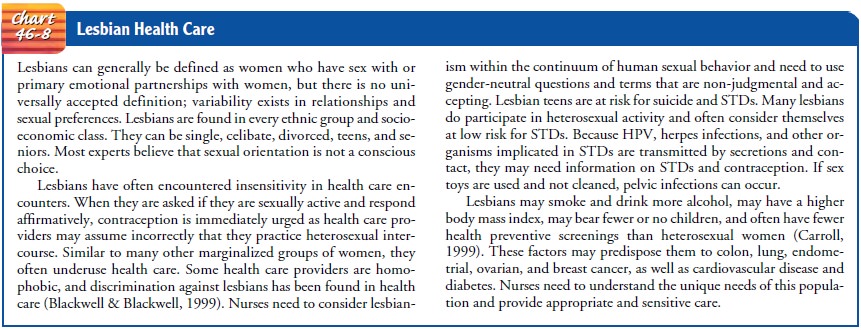Chapter: Medical Surgical Nursing: Assessment and Management of Female Physiologic Processes
Menstruation - Management of Normal and Altered Female Physiologic Processes
Management of Normal and Altered
Female Physiologic Processes
Many
health concerns of women are related to normal changes or abnormalities of the
menstrual cycle. Many result from women’s lack of understanding of the
menstrual cycle, developmental changes, and factors that may affect the pattern
of the menstrual cycle. Educating women about the menstrual cycle and changes
over time is an important aspect of the nurse’s role in providing quality care
to women. Teaching should begin early, so that men-struation and the lifelong
changes in the menstrual cycle can be anticipated and accepted as a normal part
of life.
MENSTRUATION
Menstruation,
a cyclic vaginal flow of tissue that lines the uterus, occurs about every 28
days during the reproductive years, although normal cycles can vary from 21 to
42 days. The flow usually lasts 4 to 5 days, during which time 50 to 60 mL (4
to 12 teaspoons) of blood are lost.
A
perineal pad is generally used to absorb menstrual discharge; deodorant-treated
pads are available, but some women are allergic or sensitive to the deodorants.
Tampons are also used extensively; there is no significant evidence of untoward
effects from their use, provided that there is no difficulty in inserting them.
However, tampons should not be used for more than 4 to 6 hours, nor should
superabsorbent tampons be used because of the associa-tion with toxic shock
syndrome. If a tampon is hard to remove, the vagina feels dry, or the tampon
shreds when removed, less absorbent tampons should be used. If the string
breaks or retracts, a woman should squat in a comfortable position, insert one
finger into the vagina, try to locate the tampon, and remove it. If the woman
feels un-comfortable attempting this maneuver or if she cannot remove the
tampon, she should consult a health care provider.
Psychosocial Considerations
Girls
who are approaching menarche (the onset of menstruation) should be instructed
about the normal process of the menstrual cycle before it occurs.
Psychologically, it is much healthier to refer to this event as a “period”
rather than as “being sick.” With ade-quate nutrition, rest, and exercise, most
women feel little dis-comfort, although some report breast tenderness and a
feeling of fullness 1 or 2 days before menstruation begins. Others report
fa-tigue and some discomfort in the lower back, legs, and pelvis on the first
day and temperament or mood changes. Slight deviations from a usual pattern of
daily living are considered normal, but ex-cessive deviation may require
evaluation. Regular exercise and a low-fat vegetarian diet have been found to decrease
discomfort. Heating pads may be very effective for cramps, as may non-steroidal
anti-inflammatory drugs (NSAIDs). The patient with excessive cramping or
dysmenorrhea is referred to a gynecologist; oral contraceptives may be
prescribed following evaluation.
Cultural Considerations
The
United States is becoming more culturally diverse. Culture can be defined as
the thoughts, communications, actions, cus-toms, beliefs, and values of a
racial, ethnic, religious, or social group. These aspects of culture affect
many health care encoun-ters, and these encounters can be positive if nurses
understand the various cultures of their patients.Differing cultural views and
beliefs on menstruation exist. Some women believe that it is detrimental to
change a pad or tampon too frequently; they think that allowing the discharge
to accumulate increases the flow, which is considered desirable. Some women
believe they are vulnerable to illness during men-struation. Others feel it is
harmful to swim, shower, have their hair permed, have their teeth filled, or
eat certain foods during menstruation. They may also avoid using contraception.
In
such situations, the nurse is in a position to provide women with facts in an
accepting and culturally sensitive manner. The ob-jective is to be mindful of
these unexpressed, deep-rooted beliefs and to provide the facts with care.
Aspects of gynecologic prob-lems cannot always be expressed easily. The nurse
needs to convey confidence and openness and to offer facts to facilitate communi-cation.
Suggestions to improve care include overcoming language barriers, providing
language-appropriate materials, asking about traditional beliefs and dietary
practices, and asking patients about their fears regarding care (Mattson,
2000). Patience, sensitivity, and a desire to learn about other cultures and
groups will enhance the nursing care of all women (Chart 46-8).

Related Topics